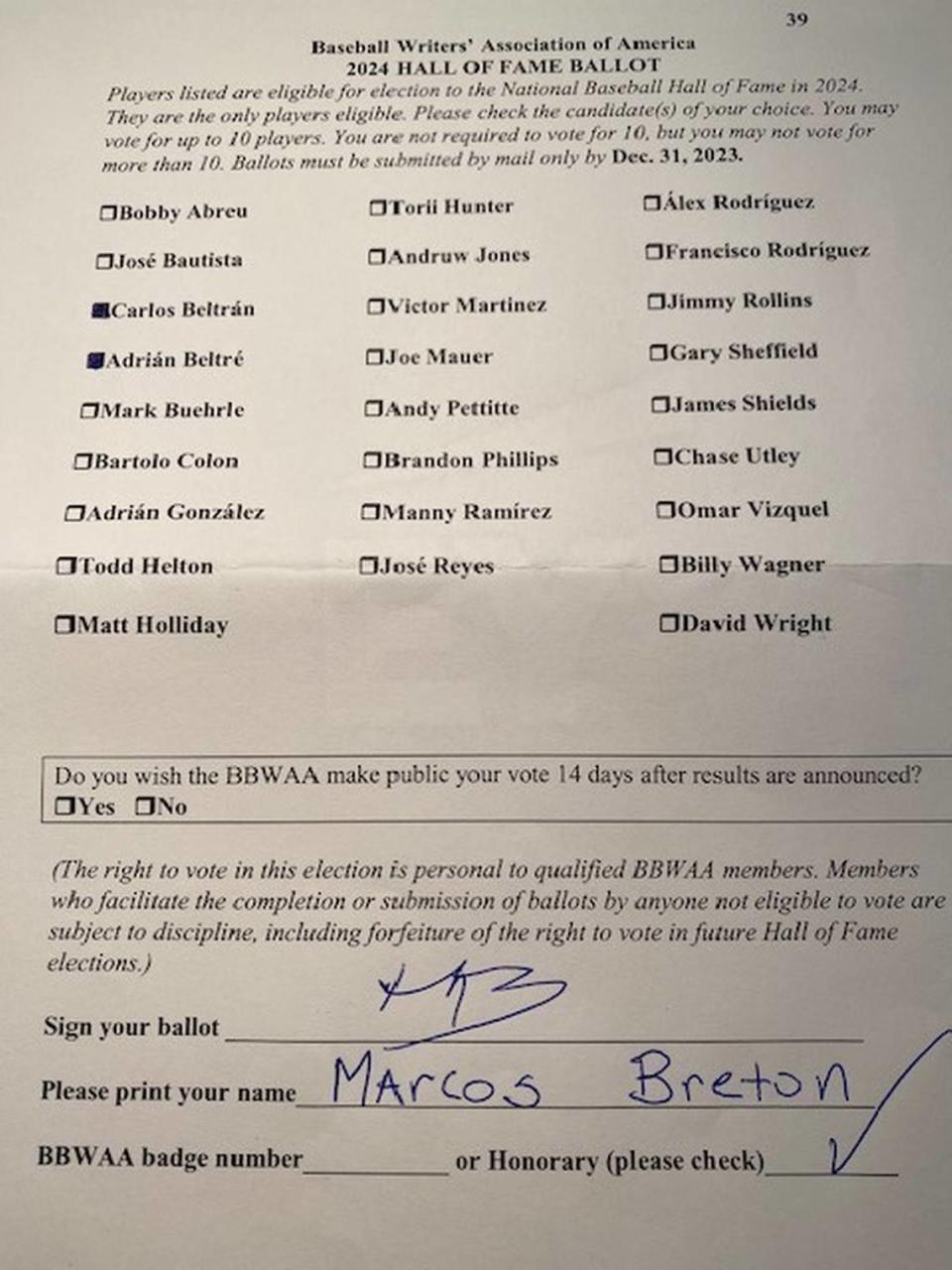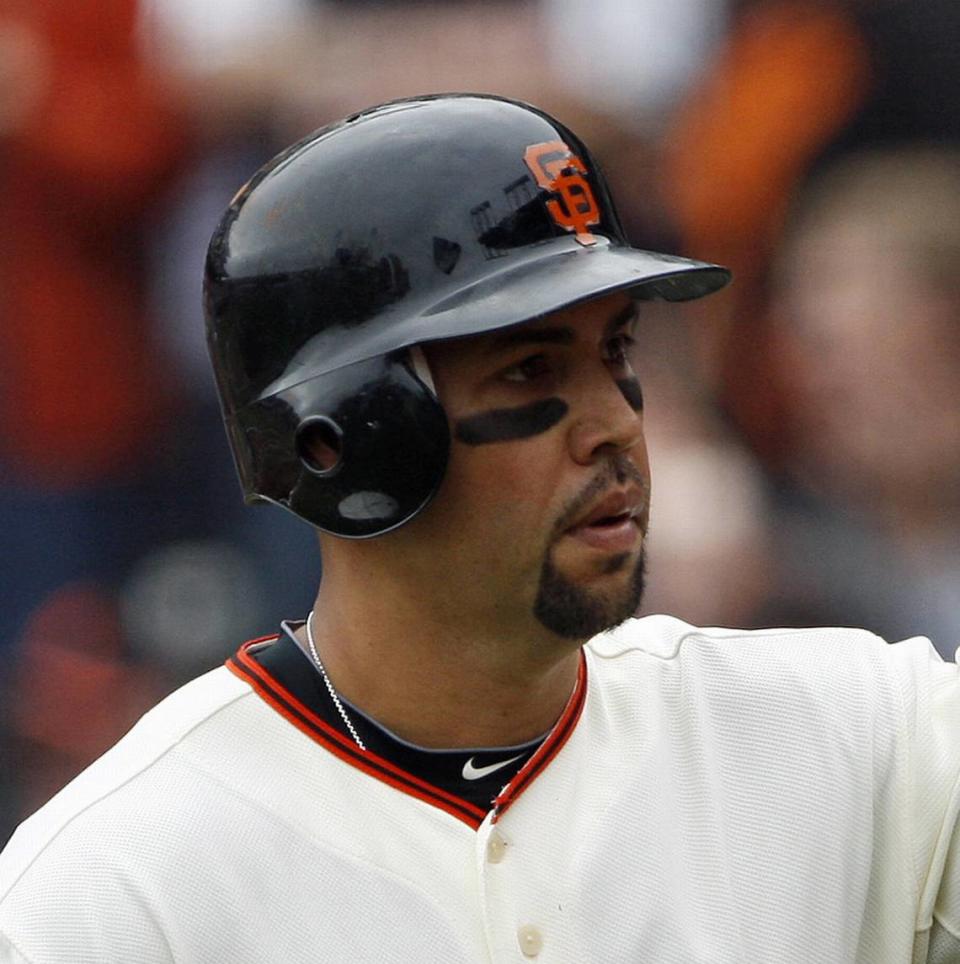I was crushed on social media for my Baseball Hall of Fame votes. I’m not sorry | Opinion
- Oops!Something went wrong.Please try again later.
- Oops!Something went wrong.Please try again later.
On Wednesday morning, right in the middle of my vacation, I remembered to post my Baseball Hall of Fame ballot on social media. I do this annually at the turn of the year because even though baseball writers can keep their selections secret, I think people should know how we vote and why.
Within minutes, however, I learned why some writers never share their ballots publicly.
Opinion
I was pummeled from all sides by fans calling me a stupid moron, a feckless moron, a cowardly moron, a disgraceful moron and other forms of morons that cannot be shared verbatim in a family newspaper.
According to some, my dead parents should be exhumed and put on trial for bringing me into the world.
I exaggerate, of course. But not by much.
Since the convergence of the first “steroid-tainted players” in 2013, an obsession with advanced metrics in baseball in the last 20 years and the rise of social media in the last 15, the voting process for the Hall of Fame has become toxic.
It started with an argument that has no right or wrong answer, only passionately held beliefs: Should players linked to performance-enhancing drugs be inducted into the Hall of Fame? Barry Bonds and Roger Clemens were the symbols of this argument and I voted for them every time they were on my ballot.
For 10 years, all of us who voted this way were blown up on social media for supporting “cheaters.” I even had an old friend who told me that he would never speak to me again if I voted for Bonds. You know what? He never did speak to me again.
Since then, voting intolerance has spread like a disease.
Social media umpires see errors
In 2016, Ken Griffey Jr. was elected to the Hall of Fame with a then-record 99.3% of the votes. But instead of celebrating this, the pitchforks and Tiki torches came out for the three writers who left Griffey off their ballots. The mob wanted its pound of flesh.
In 2019, Mariano Rivera became the first player to be elected to the Hall of Fame unanimously. A reliever who typically worked an inning a game garnered a higher percentage of votes than Babe Ruth. I believe it was because today’s Hall of Fame voters feared a public backlash if they dared leave Rivera off their ballots.
There have been more incidents, and more public shaming of writers, but you get the point.
The big sin now is if you don’t vote for 10 players on your ballot, even though nothing in the voting rules says you must pick 10 players. The rules only say you can pick up to 10.
No rules say if you vote for a player one year you have to keep voting for him if his name is still on your ballot the next year. No rules say a player is “either a Hall of Famer or he isn’t.”
But some baseball fans act as if these opinions should be enforced as rules.

Because I only voted for two guys this year — Adrian Beltre and Carlos Beltran — the fanboy mob became infuriated.
“One of the worst ballots I’ve seen so far, folks,” tweeted an account on X, formerly known as Twitter. “Beltre (sure), Beltran (fine), and… no one else. Even worse, this voter inexplicably dropped Andruw (Jones), Manny (Ramirez), A-Rod (Alex Rodriguez), and (Billy) Wagner since last year; maybe they all had bad stats in 2023.”
One of the worst ballots I’ve seen so far folks
Beltre (sure), Beltran (fine), and… no one else
Even worse, this voter inexplicably dropped Andruw, Manny, A-Rod, and Wagner since last year; maybe they all had bad stats in 2023 https://t.co/nIDQSq9CQp— Not Gaetti (@notgaetti) December 27, 2023
Why did I only vote for two? Because in years past I bought into the notion that I had to pick 10 players. I heard really smart voters assert to me that past ballots had up to 12 or 15 Hall-worthy players, which always struck me as odd.
If you examine the history of players inducted into the Hall of Fame by the votes of baseball writers, most years produced a small handful of winners going back to 1936. Some years saw no inductees at all elected by baseball writers but, suddenly, we want to induct 10 or more?
The case for two players
Advanced metrics not only changed how the game is played but also how players are evaluated for Hall of Fame enshrinement. Before long, voting for 10 players a year became conventional wisdom. In some years, I voted for 10 people on my ballot and was roundly praised by some for filling out “perfect” ballots.
I could have easily left well enough alone, but this year I decided I was only going to vote for candidates who I felt were sure-fire Hall of Famers. I would only pick former players who I was enthusiastic about.

Despite never winning a World Series, Beltre is one of the great third basemen of all time by traditional metrics and advanced metrics. Statistically, Beltran was an elite outfielder whose numbers compare favorably with current Hall of Famers.

Beltran was tarnished by participating in the Houston Astros sign stealing scandal, but after leaving him off my ballot last year for that, I voted for him this year because his advanced metrics say he is a Hall of Famer.
I decided not to vote for Manny Ramirez and Alex Rodriguez even though I had voted for them in the past. Last year, both got less than 40% of the vote when you need 75% or more to be elected. They aren’t getting in this year with me or without me, so why the fury?
Meanwhile, I decided not to vote for Billy Wagner and Andruw Jones this year. I felt my past votes were unduly influenced by the notion that more is better on my Hall of Fame ballot.
Beltre and Beltran were my unequivocal choices. Every other player on my ballot came with reservations that I couldn’t reconcile in time to cast my ballot by the deadline. So I went with my two guys, which infuriated a lot of people.
My tweet that contained my ballot had nearly 500,000 impressions 24 hours after I posted it. There were more than 500 comments. The son of a player I didn’t vote for took to X and derided me for pushing back against the most caustic comments in response to my ballot.
Did I mistakenly say on X that Gary Sheffield was still eligible for the Hall of Fame next year? Yes, it was a simple misstatement in one tweet. But to the angry mob, it was an example of why I have no business voting, which is what people assert when you don’t vote for players they like.
The truth is, even if Sheffield were eligible for the Hall of Fame next year, I wouldn’t vote for him because I think he’s a borderline candidate — as do other voters. I simply don’t want to vote for borderline candidates anymore.
Talk to the meme
Did I have to respond to caustic comments? No. I’ve been ignoring them for more than a decade and this time I decided to respond to immaturity with memes of crying babies. It’s funny how some people who behave terribly on social media suddenly become wounded when you push back. You know what? I’m not your doormat.
I know an excellent baseball writer who gave up his vote when the Hall of Fame process became toxic. Some writers today practically apologize for not being able to “please everybody” with their votes. And other writers keep their ballots secret, probably because they don’t want to be pilloried on social media like I was.
I understand the impulse, but I won’t be shamed by the lunatic fringe of a beautiful sport.

